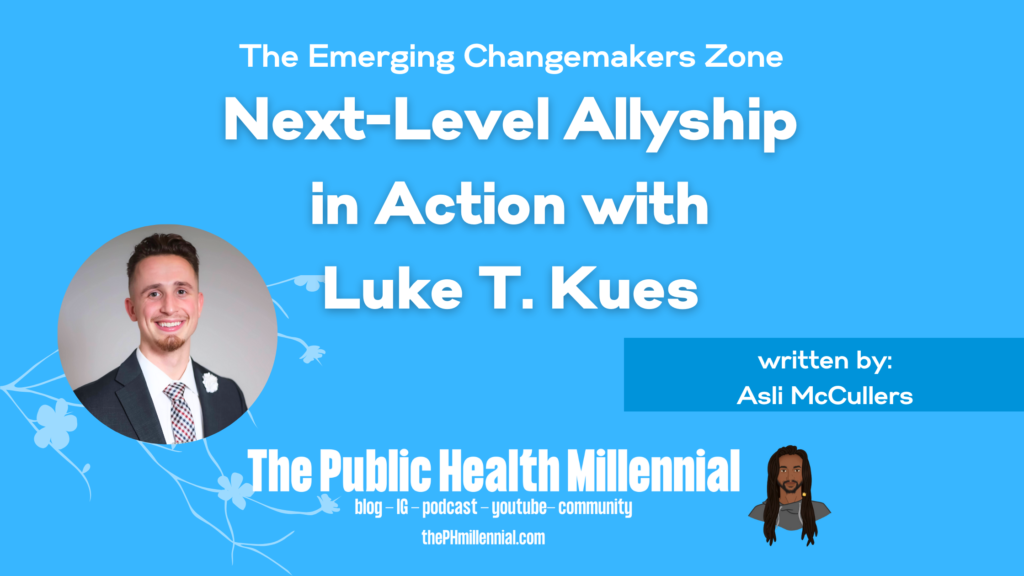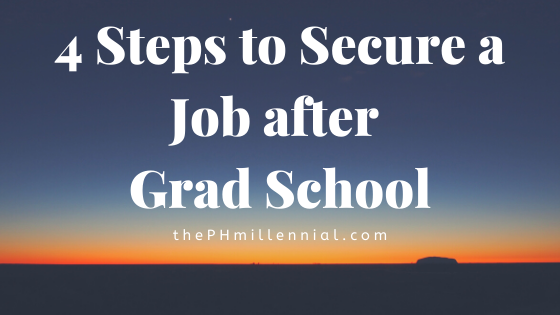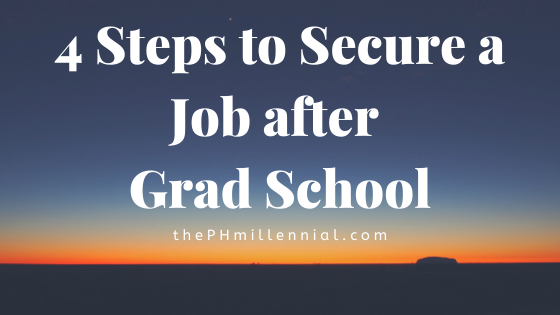How do you show up as an ally to other communities?
Luke T. Kues is a second year Behavioral and Community Health MPH student at the University of Maryland, College Park. He previously earned his Bachelor of Science in Biology and Psychology from Northern Kentucky University. This conversation covers his journey to discovering the intersection of allyship for the Black community and public health as his core passion, as well as his current and future initiatives for the global advancement of Black health.
Mind, Body, Soul: Luke’s Interest in Public Health
Born and raised in Kentucky (near Cincinnati, OH), Luke has always had a knack for connecting with others, and our conversation started with an exploration of his beginnings in public service and leadership. Luke’s health equity story began at Northern Kentucky University, where his personal experiences with mental health and wellness spearheaded into a focus on improving the mental health and wellness of marginalized communities. On this experience, he shared the following profound testimony;
“Coming into NKU, I knew I wanted to go into something health related. My sophomore year, I had a kind of “rock bottom” moment, which turned out to be a really great blessing in disguise for me. I then started a journey of really addressing some emotional and mental health challenges that I had been suppressing for a really long time. And that started me on a journey of wellness and of healing and of becoming whole that really turned into something beautiful. What I realized in that dark period is that every single human being is striving to become who they were created to be. We’re all striving to have that feeling of freedom, that feeling of being whole, of walking in your purpose…I really came to a realization at that point that in order to be able to go on that path, it takes more than just individual attributes or individual behavior change. It takes a community, it takes a support system. So, after speaking with an advisor, I knew I wanted to go into public health, because I wanted to focus more on the community structures in the community, creating communities of support.”
Luke’s inspirational beginnings were truly just that–the beginning! As NKU did not have a specific public health major, Luke ended up majoring in psychology and biology, which still created a firm foundation for his career in public health. After graduating in 2021, he relocated to Maryland not only to pursue his MPH, but also to continue expanding the reach of his non-profit, True Community
Building a True Community
Before starting his MPH, Luke made his visions for operationalized community health a reality by founding his own nonprofit organization, True Community. With partners spanning nationwide, True Community focuses on expanding access to life-saving skills in marginalized communities via First Aid and CPR/AED trainings, as well as wellness coaching and services. Read on to learn more about Luke’s amazing mission with True Community;
“True Community was founded on May 22nd, 2020. It was founded in the debriefing session after the first Breonna Taylor protest in Louisville, Kentucky. Our advisor asked us, “what does justice look like?” We gave the hyped up answers and our advisor was like, “no, you guys need to think about this critically. This is not just happening in Louisville, Kentucky. This is not just happening in 2020.” And we really started to think, what does justice actually look like? And we started talking about this idea of a community where people support each other, where people have what they need, the resources they need to be able to be balanced and to be well, and to ultimately live their purpose and do what they were created to do. And we called that ideal community— True Community.
Since that time, we’ve done a lot of expanding access to lifesaving skills. That’s been a big initiative of ours. We started in the Cincinnati area, with universities doing programming. We then expanded throughout the Midwest and South… before moving out to the east coast, we had 16 training centers. And since the past two years of me being out here (in Maryland), we now have 22 training centers. So we’ve expanded throughout the East coast as well. And we’ve certified over 7,000 people in First Aid and CPR in the past two years since we started that initiative. We had a really great opportunity this past summer to go to Ghana, and we trained a thousand people while we were in Ghana, and we partnered with the University of Cape Coast and signed an MOU with them. And we now have 18 instructors in Ghana teaching these courses even today, even year round…
it’s been a really beautiful experience…t’s been really awesome to see a vision turn into a reality and even more beautiful part about that is it’s not my vision. It is– And I truly believe this–a communal vision. And every person I’ve connected with, every person I’ve talked to, every perspective I’ve gained throughout my life, has contributed to that communal vision of what an ideal, what a true community can look like.”
I was sure to share with Luke how impressive his work is, as his efforts (along with his community) have touched many corners of the world–the impact he’s made and continues to make is as remarkable as it is incredibly kind!
Allyship 101: Radically Showing Up for the Black Community
The moment I saw Luke in our Research Methods course a few months back, I could tell he was “down with us” (iykyk, lol!). By this, I mean that there’s no mistaking Luke’s beaming pride in his fraternity, Alpha Phi Alpha Fraternity, Incorporated, as well as his other contributions to the Black community through his previous roles with the NAACP, and his specific efforts to improve Black cardiovascular health outcomes. During our interview, I was excited to learn more about how he was called to boldly support the Black community as a White man, and what some of his experiences have looked like with allyship and accompliceship. On this, he shared the following fascinating reflection;
“I think as a White man operating in a lot of predominantly Black spaces, it’s something that you don’t see a lot. And it’s something that at this point is just naturally where I’m comfortable and naturally where the people I love and care about are at. And that journey has been really interesting because I grew up in Kentucky…I grew up in a predominantly White neighborhood. My grade school, middle school experience was predominantly White. I think one of the biggest transforming experiences in my life was in 2009. I was 12 at the time, and I spent a summer in Uganda with my family. And that really opened my eyes to the beauty and the power of listening to other people’s lived experiences….
In college, I found myself with friends from all different backgrounds, African friends, African-American friends, Latino friends primarily,… hearing consistently, especially within the Black community, all the challenges and all the shared lived experiences that Black people have to go through in this country as a result of racism and discrimination, it really just weighed heavy on my heart. And I’m like, I’m with you. I love you. I care about you. Let’s fight. What do we have to do? And that really transformed into having conversations and figuring out how I could support the people I love and care about in my community and broader than that.”
Luke’s allyship to the Black community has shown to be so valuable to the many communities he’s supported. However, this can sometimes come with pushback– from Black community members questioning his intentions, to other White community members who also question his motives. Reflecting on this instances, Luke shared the following;
“I am very understanding of why Black people would be hesitant to have me in their spaces or have me around them. And I take that very seriously in terms of being intentional with how I interact in those spaces… When I first joined the NAACP and I first joined Alpha, I had a lot of people asking me questions, rightfully so. But one thing that I always say is that a show always beats a tell. And the beautiful part about that journey is that maybe about a year and a half after being a part of both those organizations, nobody had any more questions because they saw what I was doing. I was taking on leadership roles and turning an NAACP unit from 3 people to 60 people in less than six months…
You learn that yes, people are going to have questions. Yes, they should have questions.Yes, you should take the time to not only answer the questions, but also understand what they’re asking behind the questions. Most of the time, they’re just speaking about their lived experiences and maybe incidents they’ve had with White people in the past when they’re really asking you questions about yourself. And above all of that. And more important than words and more important than conversations is that if you want to be an ally and you want to be someone who is an advocate for Black people, you have to put in the work because that is the only way to really show your dedication to the advancement of the people you’re trying to stand with.”
To Luke’s testimony–showing up as an ally isn’t just about “showing up”–it’s about action and taking allyship to the next level through true accompliceship!
Luke’s Future Directions
I always look forward to asking our emerging changemakers about what their biggest aspirations are for their careers. Confidently, Luke provided the following thoughts;
“I really want to have a significant impact on bringing and expanding public health in West Africa. I also want to have a US and global impact on cardiovascular health, particularly building communities of connectedness and tackling public health issues through the foundation of connection within communities.”
I’m 120% sure Luke will do not only that, but so much more! 🙂HUGE thank you again to Luke for this wonderful conversation! Connect with Luke on LinkedIn and share this with a student interested in health equity work!



